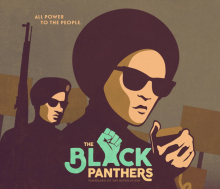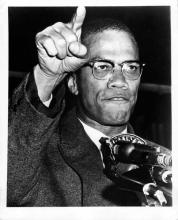malcolm x

WHEN RAHIEL TESFAMARIAM was 5 years old, she and her mother flew from Eritrea to New York City, arriving in the United States with six-month tourist visas to help prepare for Tesfamariam’s eldest sister’s wedding. After the six months had passed, Tesfamariam’s mother began packing clothes for a return trip to Eritrea, but Tesfamariam adamantly refused to leave. Tesfamariam’s brother recalls being at the airport and watching their mother step to the gate; Rahiel stepped back and said, “Bye, Mommy.” And so it was: Rahiel Tesfamariam remained in the United States in the care of her siblings, out of the shadow of the Eritrean War of Independence, with an expired travel visa.
The rest of her story could be told this way: She became a legal permanent resident of the United States, graduated from Stanford University, became the youngest-ever editor in chief of The Washington Informer, received her Master of Divinity degree from Yale University, and launched Urban Cusp, an online community for Black millennials interested in the intersection between faith, culture, and justice. Tesfamariam worked as a columnist for The Washington Post; led #NotOneDime, a national Black Friday economic boycott during the 2014 Ferguson protests; and was named by Essence magazine as one of its “New Civil Rights Leaders.” She got married. She became a mother. It could be said that Tesfamariam pulled herself up into the American dream.
Tesfamariam’s book Imagine Freedom: Transforming Pain into Political and Spiritual Power (Amistad), released earlier this year, tells that story, but with a difference. Telling only that version, like the American dream itself, would be insufficient. Tesfamariam spoke with Sojourners associate editor Darren Saint-Ulysse in April about how she carries Africa within, political power’s ephemeral nature, and God’s command to free the captives. — The Editors

A Change is Gonna Come
Regina King’s film One Night in Miami is a reflective depiction of Black excellence and the crossroads faced by a generation’s luminaries. Malcolm X, Cassius Clay, Jim Brown, and Sam Cooke consider their callings in this intimate imagining of a night that actually happened. Amazon Studios.
A Way Forward
From Seneca Falls to Stonewall to Rep. Alexandria Ocasio-Cortez, Guthrie Graves-Fitzsimmons maps the traditions of progressive Christian activism in the U.S. A healing balm and a mobilizing guide, Just Faith: Reclaiming Progressive Christianity invites readers to the co-creation of a just world. Broadleaf Books.

The similarities between 1966 and 2016 are frightening. Vanguard of the Revolution serves as a stark reminder that not much has changed in this country for black Americans. But we are here, and we are still fighting, despite knowing the full extent to which the American Empire will go to silence black outrage and destroy black unity. That should make us the vanguards of hope.

I didn’t see the film Malcolm X in theaters. I waited to see it on video. Big mistake.
I watched it in my home, just off campus from University of Southern California, late at night when everyone else was sleeping. Another big mistake.
At the time I was living in a house with one other black person and a bunch of white and Asian friends. I was attending a mostly white school and a mostly white church and had attended a mostly white institute for urban transformation that was borne out of my church. Ironically, it was there that I was required to read The Autobiography of Malcolm X. But I never read the whole thing, only sections.
So, I sat in the dark living room, lit only by the television screen, and watched Denzel Washington bring Malcolm X to life … by myself. And there, in the dark, Malcolm’s words about Jesus hit me to the core.

Rodnell Collins stood next to his uncle, Malcolm X, as the latter stared thoughtfully at Plymouth Rock during a visit to Massachusetts when Collins was a child.
It wasn’t until years later that Collins, the son of Malcolm’s sister, Ella Little Collins, would learn what his uncle was thinking: “We didn’t land on Plymouth Rock. The rock was landed on us.”
Malcolm X, the African-American nationalist leader and onetime minister of the Nation of Islam who was assassinated 50 years ago Feb. 21, inspired countless people with the frank and uncompromising way he spoke about race relations in America. And much of what he said about the experiences of black Americans remains true today, experts say.
Yet, while other civil rights leaders of the 1950s and ’60s are more broadly celebrated as American heroes, the fire with which Malcolm X spoke still overpowers the words he was saying.
Yuri Kochiyama, a Japanese-American human rights activist, died on Sunday at the age of 93. Kochiyama's family was among those Japanese-Americans interned by the United States during World War II.
NPR reports on her work:
Living in housing projects among black and Puerto Rican neighbors inspired her interest in the civil rights movement. Kochiyama held weekly open houses for activists in the family's apartment, where she taped newspaper clippings to the walls and kept piles of leaflets on the kitchen table. "Our house felt like it was the movement 24/7," said her eldest daughter Audee Kochiyama-Holman.
Kochiyama is also known for rushing towards Malcom X after his assination, where she appeared images of the incident, according to NPR:
Minutes after gunmen fired at Malcolm X in 1965 during his last speech in New York City, she rushed towards him and cradled his head on her lap. A black-and-white photo in Life magazine shows Kochiyama peering worriedly through horn-rimmed glasses at Malcolm X's bullet-riddled body.
The Christianized Jesus -- the turning of a radical into a conservative shadow of his former self -- explains our problem of establishing and celebrating freedom fighters today. It is important that our progressive heroes be given their deserved fame, an accurately reported fame, and this is crucial in ways that impact our own activism.
Jesus of Nazareth was not a Peak Performance Strategist as the prosperity preachers would have it. Nor was he a foreigner-hating patriot as the tea party would argue. Obviously American politicians and their lobbyists pursue so many policies that are against the teachings of Jesus but are supported by mainstream Christian opinion. In fact, Jesus' parables and sayings push the spiritual revolution of gift economies, and of justice through radical forgiveness.